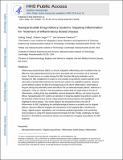| dc.contributor.author | Zhang, Sufeng | |
| dc.contributor.author | Langer, Robert S | |
| dc.contributor.author | Traverso, Giovanni | |
| dc.date.accessioned | 2022-06-03T22:28:49Z | |
| dc.date.available | 2021-10-27T20:34:56Z | |
| dc.date.available | 2022-06-03T22:28:49Z | |
| dc.date.issued | 2017 | |
| dc.identifier.issn | 1878-044X | |
| dc.identifier.uri | https://hdl.handle.net/1721.1/136341.2 | |
| dc.description.abstract | © 2017 Elsevier Ltd Inflammatory bowel disease (IBD) is a chronic, idiopathic inflammatory set of conditions that can affect the entire gastrointestinal (GI) tract and is associated with an increased risk of colorectal cancer. To date there is no curative therapy for IBD; therefore life-long medication can be necessary for IBD management if surgery is to be avoided. Drug delivery systems specific to the colon have improved IBD treatment and several such systems are available to patients. However, current delivery systems for IBD do not target drugs to the site of inflammation, which leads to frequent dosing and potentially severe side effects that can adversely impact patients’ adherence to medication. There is a need for novel drug delivery systems that can target drugs to the site of inflammation, prolong local drug availability, improve therapeutic efficacy, and reduce drug side effects. Nanoparticulate (NP) systems are attractive in designing targeted drug delivery systems for the treatment of IBD because of their unique physicochemical properties and capability of targeting the site of disease. This review analyzes the microenvironment at the site of inflammation in IBD, highlighting the pathophysiological features as possible cues for targeted delivery; discusses different strategies and mechanisms of NP targeting IBD, including size-, charge-, ligand-receptor-, degradation- and microbiome-mediated approaches; and summarizes recent progress on using NPs towards improved therapies for IBD. Finally, challenges and future directions in this field are presented to advance the development of targeted drug delivery for IBD treatment. | en_US |
| dc.description.sponsorship | NIH Grant (EB-000244) | en_US |
| dc.description.sponsorship | Max Planck Research Award, Award Ltr Dtd. 2/11/08 | en_US |
| dc.language.iso | en | |
| dc.publisher | Elsevier BV | en_US |
| dc.relation.isversionof | https://dx.doi.org/10.1016/J.NANTOD.2017.08.006 | en_US |
| dc.rights | Creative Commons Attribution-NonCommercial-NoDerivs License | en_US |
| dc.rights.uri | http://creativecommons.org/licenses/by-nc-nd/4.0/ | en_US |
| dc.source | PMC | en_US |
| dc.title | Nanoparticulate drug delivery systems targeting inflammation for treatment of inflammatory bowel disease | en_US |
| dc.type | Article | en_US |
| dc.contributor.department | Koch Institute for Integrative Cancer Research at MIT | en_US |
| dc.contributor.department | Massachusetts Institute of Technology. Department of Chemical Engineering | en_US |
| dc.contributor.department | Massachusetts Institute of Technology. Media Laboratory | en_US |
| dc.contributor.department | Massachusetts Institute of Technology. Institute for Medical Engineering & Science | en_US |
| dc.relation.journal | Nano Today | en_US |
| dc.eprint.version | Author's final manuscript | en_US |
| dc.type.uri | http://purl.org/eprint/type/JournalArticle | en_US |
| eprint.status | http://purl.org/eprint/status/PeerReviewed | en_US |
| dc.date.updated | 2019-09-06T19:12:22Z | |
| dspace.orderedauthors | Zhang, S; Langer, R; Traverso, G | en_US |
| dspace.date.submission | 2019-09-06T19:12:23Z | |
| mit.journal.volume | 16 | en_US |
| mit.metadata.status | Publication Information Needed | en_US |
